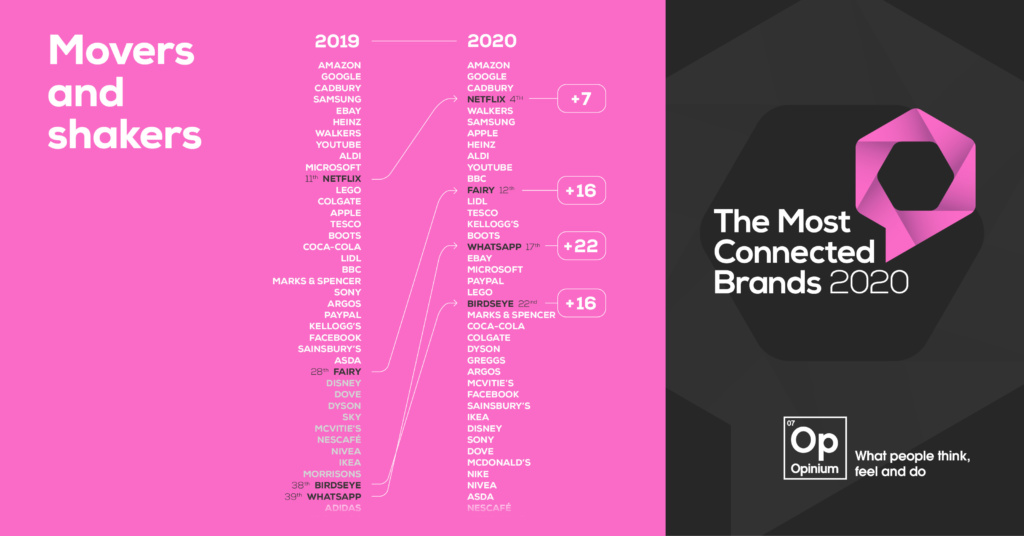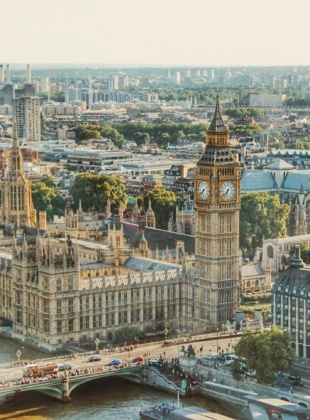Movers and shakers: 2019 vs 2020 Most Connected Brands UK

When we look at the very top of our Most Connected Brands Index over the last two years the top three remain consistent: Amazon, Google and Cadbury retain their spots, the other entrants of the Top 10 just shuffle positions. However, there is one noticeable newcomer, which jumps seven places versus their 2019 ranking – Netflix.
Netflix has continued its meteoric rise from 30th in 2018 to fourth in 2020. This is no small feat amid such illustrious company, so how has the media-services provider managed it?
A key driver has been Netflix’s growth in Prominence, which has been fuelled by their aggressive push on Above-the-Line (ATL) activity. In 2019 the brand’s media spend grew by 28% meaning that since the start of 2017, Netflix has almost tripled their ATL investment – a clear indication of their financial commitment to raising top of mind awareness amongst consumers.
For many, Netflix represents a fundamental shift in how we consume films and television. A similar shift in how we communicate can also be seen as responsible for propelling another brand up the 2020 rankings: WhatsApp.
It’s hard to find someone not in a WhatsApp group. From kids at school, to the parents of the football team, to friendship groups and work groups, WhatsApp has become the go-to platform for quick group communication. This has been cemented
by the lockdown which has seen a wealth of intergenerational family groups spring up.
WhatsApp builds connection through Dynamism, Distinction and satisfaction. Its distinct offer is incredibly easy to use, works perfectly with the always-on way of life and facilitates the constant need for communication and sharing.
Yet even though two of the most prominent movers are technology platforms, there remains a diverse spread of brands from across other categories which have improved their connection with consumers. A case in point are two old school FMCG brands, hailing from the perhaps less fashionable categories of frozen food and household cleaning.
Fairy is a brand that has been with us for decades and that is very much at the heart of how the brand has built a strong emotional bond with consumers. Rating sixth for Emotional connection, the public have complete faith that the product won’t let them down, making Fairy one of the top brands we can’t live without.
In recent times, Fairy has also addressed sustainability clearly and with transparency. Tapping into the modern mind set of social responsibility, CSR is now a clear strength for the brand. That modern mind set has also led the brand to a partnership with LBGTQ charity the Albert Kennedy Trust, and actor and singer Duncan James to help provide accommodation for homeless members of this community.
With the quest for health eating and scratch cooking rather flying in the face of frozen food, it may be a surprise to see Birds Eye also improving its position in the ranking. Trading in similar territory to Fairy, Birds Eye is renowned for having products that deliver and being that dependable family favourite that we have all grown up with. However, heritage does not guarantee connection, and Birds Eye have successfully remained relevant to consumers through activity such as ‘Eat in full colour’ promoting steam fresh frozen veg and ‘So what’s for tea’ which provides help, support, and inspiration for the brand’s heartland of busy families.

But, as some brands rise up the rankings, others inevitably have to fall.
One of the most noticeable trends this year takes place outside of the top 50. Ford, BMW, Volkswagen, Toyota and Mercedes-Benz have all witnessed sizeable drops in their ranking. As our data is drawn from before the Coronavirus crisis, this does not bode well for a sector which has been particularly hard hit during the lockdown period. The drop in connection for consumers may also be explained by the fall in car registrations and a shift in consumer attitude to more environmentally friendly ways of transport.
Greggs, the highest new entrant on the MCB Index, rockets in at number 27. Propelled by what is now considered to be a masterclass in culturally relevant marketing, the largest bakery chain in the UK ranks sixth for Dynamism, ahead of brands such as Samsung, Apple and YouTube. From sending vegan sausage rolls in mock iPhone packaging to journalists to provoking Good Morning Britain TV presenter Piers Morgan to tweet “Nobody was waiting for a vegan bloody sausage, you PC-ravaged clowns” to masquerading as Gregory & Gregory and successfully convincing consumers that its Oriental Chicken Sticky Rice Salad was haute cuisine; Gregg’s tongue-in-cheek marketing has vastly outstripped any potential media spend. Whilst fast food rivals McDonald’s (37th) and KFC (74th) have also both moved up the rankings, Greggs has shown that strong brands can just as quickly be built with clever ideas and excellent execution.
The Wetherspoons brand is no stranger to controversy. Whilst founder Tim Martin alienated and enraptured consumers in equal measure for his pro-Brexit stance, Wetherspoons enters the Most Connected Brand Index in 65th place. Scoring relatively consistently across all four-key metrics, Wetherspoons ranks 43rd in terms of Distinction suggesting that you don’t have to please everyone all of the time in order to succeed. The backlash against Martin’s comments during the coronavirus
pandemic that “virus doesn’t spread in pubs” in a bid to keep them open during lockdown has, however, been significant. The launch and growing popularity of apps such ‘Neverspoons’ – created to showcase independent pubs located in the vicinity of Wetherspoons, suggests that in the future the brand may therefore need to find a way to balance controversy with connection in order to not simply survive, but grow.
Download the full report at www.mostconnectedbrands.com





